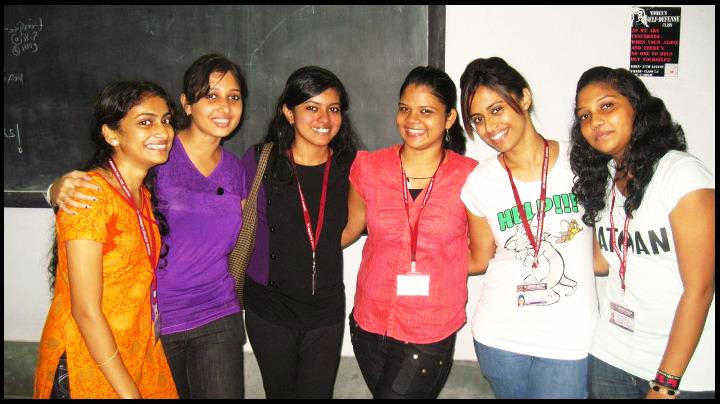India is a-buzz with anti-eve teasing (street harassment) activities, especially on college campuses. One of the most recent initiatives is called “Freeze the Tease.”
Six students at St. Andrews College in Mumbai, India, run the campaign—Perma Dsouza, Andrea Fernades, Digi George, Anishka Alvares, Rochelle Barrie and Valeska Reveredo—and they kindly agreed to talk about their work through an e-mail interview.

 1. Stop Street Harassment (SSH): What is Freeze the Tease?
1. Stop Street Harassment (SSH): What is Freeze the Tease?
Freeze the Tease (FTT): It’s an anti-eve teasing initiative. The term “eve-teasing” sounds playful, but it is not teasing it’s harassment and today it has become a daily torment for most of the women. Our campaign asks, “Why be harassed by these lechers .. its time to react and FREEZE THE TEASE!”
2. SSH: What inspired the creation of Freeze the Tease?
FTT: It all started merely as an assignment as part of our curriculum as we are students of mass media, but as time passed we realised that this is a very prevalent problem girls have to undergo in their day- to-day life and a small effort by us can help create awareness.
3. SSH: What kind of activities and work does the project involve? Can you describe the “signature campaign”?
FTT: We started by creating a Facebook page as it was the best medium to create awareness amongst the masses. Also we started sending SMS texts of tips on how to tackle eve-teasing with a mere subscription fee of RS.3. In order to build awareness within our campus itself we began with a signature campaign where we motivated and encouraged girls to fight back for their rights through which students would come and sign on the scroll as a pledge to freeze the tease and not stay silent anymore. They were also given bands with the slogan, “I PLEDGE TO FREEZE THE TEASE” to wear as an indication of their support towards the social cause.
4. SSH: What is the goal of Freeze the Tease? Where do you hope to see Freeze the Tease in a year?
FTT: Our ultimate goal is to put a stop to eve-teasing however, it not as easy as it sounds therefore we hope that with this campaign we can create maximum awareness so that people fight back against this evil in our society. Our aim is also to encourage girls not to be silent and instead freeze the eve-teaser rather than get frozen during such situations. We hope that Freeze the Tease initiative can fulfill these goals. Presently being only in Mumbai, India, we’ d also like if the campaign is started in other parts of the country and around the world.
5. SSH: What has been the reception of the project at St. Andrew’s College and in the community around the college?
FTT: Our college has been supporting us from the very start. Also the community willingly accepts our campaign and shows immense support.
6. SSH: What advice would you give to a different college who may want to do a project around eve teasing issues?
FTT: Encourage and engage as many girls as possible to protect themselves and take a initiative against eve-teasing.
7. SSH: Anything else you’d like to say?
FTT: We are presently organizing some outdoor activities and events to engage women and encourage them to freeze the tease.
Since conducting the interview, Freeze the Tease undertook one of their planned outdoor activities.
“On September 22, 2011 they distributed “Freeze the Tease” bands across the prominent hotspots in Bandra to spread the word among the general public about this social cause and to make girls aware that being a silent victim to such atrocious behavior is not a solution. This outdoor activity proved to be successful as people showed interest in attaining more information about the campaign and their online activity. They went to other public places too as an attempt to bring about widespread recognition and change the mindset of the entire society.”
Great work! You can view photos of their awareness and pledge campaigns on the Facebook page and contact them (FreezetheTease AT Gmail DOT com) if you’re interested in bringing Freeze the Tease to your campus or community!


